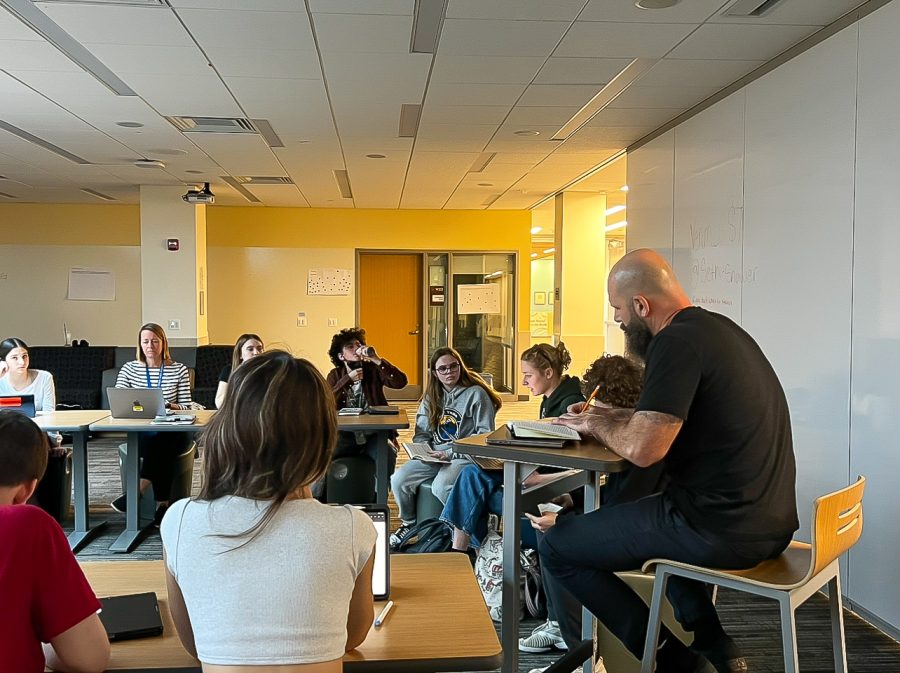Revamped adviser program set to launch next school year
Under new system, school hopes to address increased complexity of students
Meyer
Next year, art teacher Darrin Jezioriski will take on the role of Adviser Chair as part of new Graduating Class Teams
For two decades, Darrin Jeziorski has been an art teacher, coach, and adviser at New Trier. Every step of the way, he has strived to step out of his comfort zone – and next school year is no exception, as he takes on the challenge of being an Adviser Chair.
“When this opportunity came up, I figured [it was] a good time in my career to kind of change directions a little bit,” said Jeziorski.
In recent years, the needs of the student body have become more complex, as there has been an upward trend in chronic absenteeism, school avoidance, and students who are hospitalized. This has made the role of an Adviser Chair not only more important but more demanding.
Superintendent Paul Sally says that the school wants to make sure that every student receives the best support they need but more work needs to be done to achieve that.
“We needed some increased capacity in order to be able to do that,” said Sally.
What school officials came up with was to create a unified, consistent team for each graduating class. These Graduating Class Teams will be led by an assistant principal, and include two Adviser Chairs, advisers, and student service liaisons, from areas such as MTSS, Post High School Counseling, school psychologists, social work, and special education.
These teams will be with students throughout their high school careers, with the exception of freshman year. However, when students come to the Winnetka campus, they will be assigned new Adviser Chairs, who will work with them until graduation.
For Jeziorski, that was an important element of this system.
“In the advisor chair role, with these new graduating class teams, that’s going to be an opportunity to develop…relationships over time, instead of seeing different kids [each] year,” said Jeziorski.
For most of the student body, when they are asked to meet with the Adviser Chairs, it is to be disciplined or to discuss unexcused absences. In most cases, they are sent to detention.
These instances of improper behavior can, at times, impact school culture.
“The community that we are trying to build, both in the classroom [and] in the advisor room…gets broken a little by what the kid might have done,” said Sally.
For New Trier to cultivate an equitable environment, where each student has the opportunity to flourish, Sally noted that the use of restorative practices was necessary. Their hope is that, unlike detention, students would have the opportunity to reflect on their behavior, and develop strategies on how they would deal with that situation differently.
“There’s a personal accountability of restorative justice that I think is really healthy for student growth,” said Sally.
The administration also hopes to become more effective under this new system.
Currently, the assistant principal for student services (a role that, under the new system, will be known as an associate principal) has a lot to do on a day-to-day basis, including supervising the adviser program at Winnetka. Next school year, however, many of their responsibilities will fall on the three new assistant principals, which allows them to think strategically, and on long-term initiatives.
“This will allow our principal and associate principals to have time to really listen to, interact with, and give students more of a voice than they have now,” said Sally.
Sally said that throughout this process, a focus has been placed on where New Trier will be in a decade, as many teachers and administrators are retiring in that time frame.
To make sure that faculty and staff understand New Trier culture, there has been an increase in leadership positions within the administration, adviser program, academic departments, and other areas around the school.
This is personally important for Sally, who has been at New Trier for almost three decades.
“I want to make sure that I leave New Trier in good hands and part of that is making sure that we have teachers and leaders who sort of understand the New Trier culture,” said Sally.








































